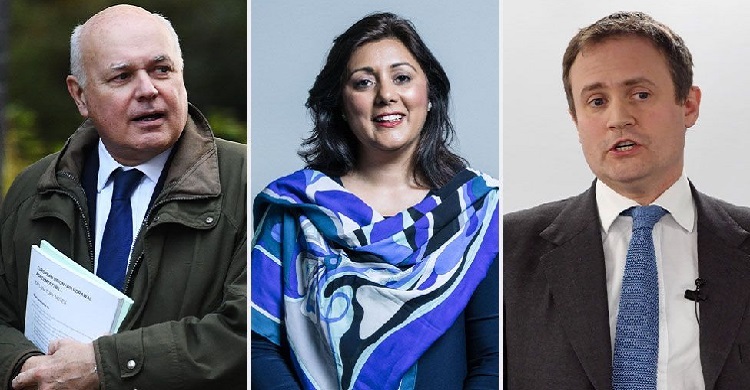China bans UK MPs after Uighur abuse sanctions

China has imposed sanctions on nine UK citizens - including five MPs - for spreading what it called "lies and disinformation" about the country.
The group are among the most vocal critics of China in the UK.
It comes in retaliation for measures taken by the UK government on Monday over human rights abuses against the Uighur Muslim minority group.
The foreign secretary said if Beijing wanted to "credibly rebut" the claims it should allow UN access to Xinjiang.
Those targeted by China include former Conservative leader Sir Iain Duncan Smith, two peers, a lawyer and an academic.
Sir Iain said he would wear the sanctions "as a badge of honour".
The response by China follows similar sanctions imposed on the European Union, which was part of the co-ordinated action on Monday, along with the UK, the US and Canada.
China has detained Uighurs at camps in the north-west region of Xinjiang, where allegations of torture, forced labour and sexual abuse have emerged.
It has denied the allegations of abuse, claiming the camps are "re-education" facilities used to combat terrorism.
The nine people facing sanctions are:
- Tory MPs Sir Iain, Nusrat Ghani and Tim Loughton, and peers Baroness Kennedy and Lord Alton, who are all members of the Inter-Parliamentary Alliance on China
- Tory MPs Tom Tugendhat and Neil O'Brien, who lead the China Research Group
- Lawyer Sir Geoffrey Nice QC, chair of the Uighur Tribunal, which is investigating atrocities against the minority group
- Newcastle University academic Jo Smith Finley, whose research focuses on the Uighurs.
They will all be banned from entering China, Hong Kong and Macau, their property in China will be frozen and Chinese citizens and institutions will be prohibited from doing business with them.
Sir Iain said: "It is our duty to call out the Chinese governments human rights abuses in Hong Kong and their genocide of the Uighur people.
"Those of us who live free lives under the rule of law must speak for those who have no voice. If that brings the anger of China down upon me then I shall wear that as a badge of honour."
Ms Ghani told BBC Radio 4's Today programme: "This is a wake-up call for all democratic countries and law makers that we will not be able to conduct our day-to-day business without China sanctioning us for just attempting to expose what's happening in Xinjiang and the abuse against the Uighurs."
She added: "I won't be intimidated. This has now made me even more determined to speak out about the Uighurs."
Academic Ms Smith Finley tweeted: "I have no regrets for speaking out, and I will not be silenced."
Foreign Secretary Dominic Raab said: "It speaks volumes that, while the UK joins the international community in sanctioning those responsible for human rights abuses, the Chinese government sanctions its critics.
"If Beijing want to credibly rebut claims of human rights abuses in Xinjiang, it should allow the UN High Commissioner for Human Rights full access to verify the truth. "
A Chinese foreign ministry spokesman said the UK's decision to impose sanctions "flagrantly breaches international law and basic norms governing international relations, grossly interferes in China's internal affairs, and severely undermines China-UK relations".
He added that the Chinese Foreign Ministry had summoned the British Ambassador to China to "lodge solemn representations, expressing firm opposition and strong condemnation".
Four groups have also been sanctioned - the China Research Group, the Conservative Party Human Rights Commission, the Uighur Tribunal, and Essex Court Chambers.
A legal opinion by senior barristers at Essex Court Chambers had concluded there was a "very credible case" that the Chinese government was committing genocide against the Uighurs.
An Inter-Parliamentary Alliance on China spokesman said: "The decision to sanction five of our British members is a flagrant assault on those Parliamentarians' rights to conduct their duties.
"We will be making urgent representations to ministers and the House authorities to see that they're protected from danger or harm as a result of the communist party's bullying."
After UK sanctions were announced on Monday, UK Foreign Secretary Dominic Raab called the abuse of Uighur Muslims in Xinjiang "one of the worst human rights crises of our time".
More than a million Uighurs and other minorities are estimated to have been detained in camps in Xinjiang.
Xinjiang lies in the north-west of China and is the country's biggest region. Like Tibet, it is autonomous, meaning - in theory - it has some powers of self-governance. But in practice, both face major restrictions by the central government.
Uighurs living in the region speak their own language, similar to Turkish, and see themselves as culturally and ethnically close to Central Asian nations.
The Chinese government has been accused of carrying out forced sterilisations on Uighur women and separating children from their families.
The country initially denied the existence of the camps, before defending them as a necessary measure against terrorism. It has denied allegations of human rights abuses.
Source: BBC







